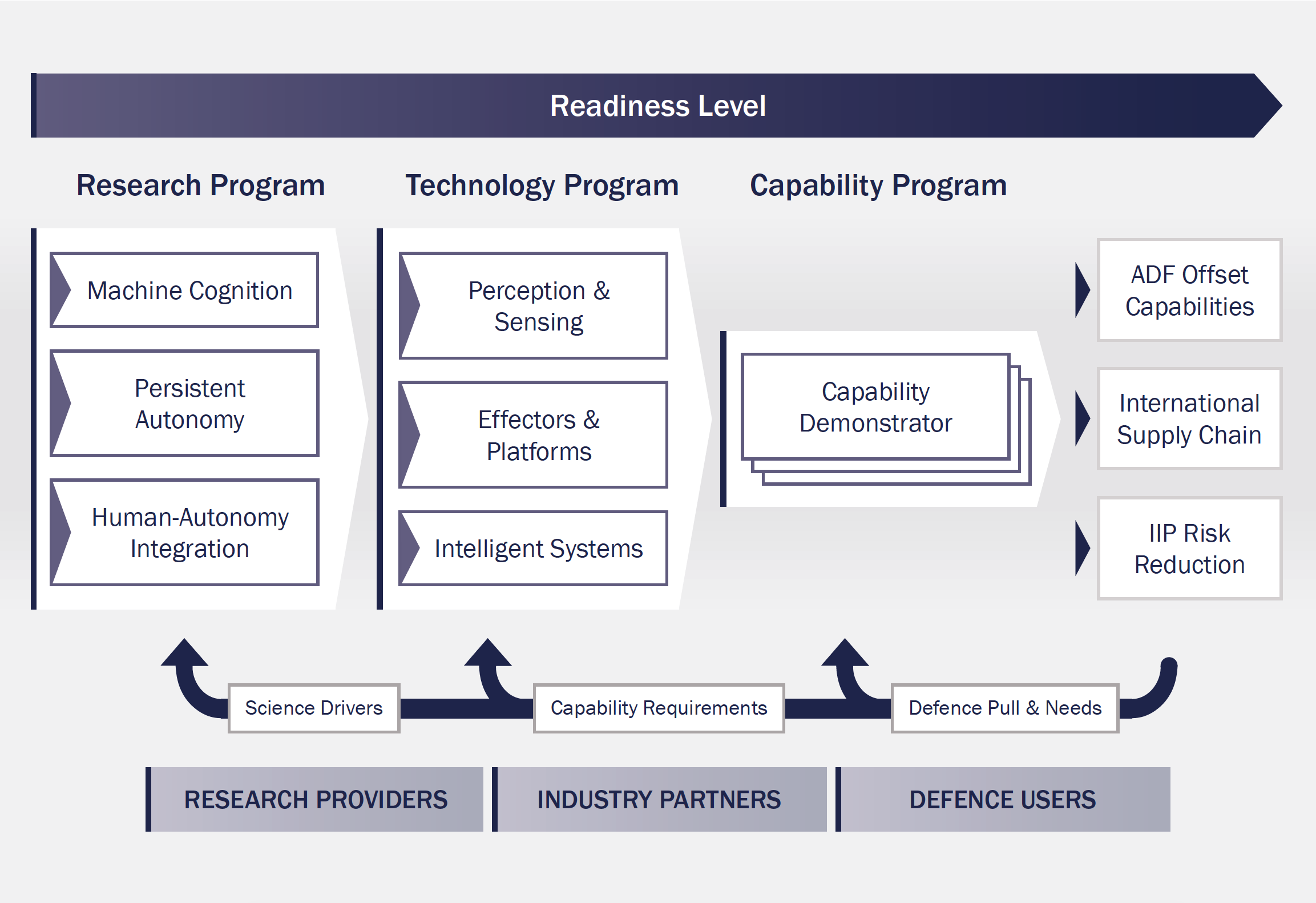
Defence Cooperative Research Centre
The Minister for Defence Industry, the Honorable Christopher Pyne MP, announced the launch of the Defence Cooperative Research Centre (CRC) in Trusted Autonomous Systems on 6 July 2017. This represents a $AU50 million investment from the Next Generation Technologies Fund (NGTF), a new government initiative that formed part of the 2016 Defence Industry Policy Statement. This is the first Defence CRC (DCRC) to be established under the NGTF. The Trusted Autonomous Systems DCRC is chaired by Mr Jim McDowell, who has had an extensive career in the Defence industry, most recently at the University of South Australia. The DCRC will receive annual funding of up to $AU8 million with a maximum of $AU50 million over a seven-year period. It will be a collaborative program that brings together industry (particularly SMEs), academia, and publicly funded research agencies to create an interlocking research and innovation capability. It will focus on developing capability in the form of unmanned platforms that ensure reliable and effective cooperation between people and machines during dynamic military operations.
The DCRC success rests on:
- Creating and fostering game-changing research of world standing, that pushes the theoretical and practical boundaries of future trusted autonomous systems.
- Delivery of autonomous systems and robotics technology with clear translation into deployable defence programs and capabilities for Australian Defence.
- Building an environment in which Australian industry has the capacity and skills to deliver complex autonomous systems both to Australian Defence and as integral members of the global defence supply chain.
This is illustrated by the three pillars and flow in the following strategy diagram.

The goal of this DCRC is to deliver world-leading autonomous and robotic technologies to the ADF that enables trusted and effective cooperation between humans and machines. The objectives include:
- Develop highly self-sufficient and survivable systems; (SAE level 4+)1
- Develop highly self-determining and self-aware systems; (SAE level 4+)
- Develop human-autonomy systems that are human and context aware
- Increase the speed to reach a deployable state for trusted autonomous systems
- Increase the scalability and reduce the cost of autonomous systems technology solutions
- Educate in the ethics and legal aspects of autonomous systems and shape national policy
- Advocate and shape national regulations.
The research program has three themes which reflect responses to a common question about the lack of physical robots in our daily lives: “Autonomous systems have been promised for decades, why haven’t they arrived yet?”. Is it because:
- They aren’t smart enough?, potentially implying that robots need machine cognition
- They aren’t resilient enough?, potentially implying that robots need persistent autonomy
- People don’t trust them?, potentially implying that robots need human-autonomy integration.
The technology program aims to deliver key components into the capability demonstrator program as well as pull through and integrate outcomes from the research program. Three areas for component technologies include:
- Perception and Sensing – including resilient perception, scene situation and self-understanding, modular low-cost intelligent sensors, bio-inspired sensing.
- Effectors and Platforms – self-healing platforms, adaptable platforms and effectors, bio-inspired platforms, micro-systems, novel actuation, low observability.
- Intelligent Systems – multi-modal multi-platform data fusion, multi-platform decision making, human-system integration.
The capability program aims to showcase through demonstration, integrated autonomous system technology, and research at a level that is realistic against actual and potential defence requirements. The first Capability Demonstration activity is Autonomous Warrior 2018, led in conjunction with RAN Exercise Ocean Raider in Jervis Bay in November 2018. It will feature contributions by Australian Industry and FVYE partners from The Technical Cooperation Program (TTCP) with their Autonomy Strategic Challenge.
The DCRC further aims to conduct activities of ‘common good’ for Industry and the nation, in advancing the ethical and legal design of trusted autonomous systems, and systemic assurance to underpin the certification of products and technologies.
The approach of the DCRC is agile, with only a part of the total budget committed at start up in 2018. As a result, ongoing opportunities will exist over the life of the program to embrace new industry ideas and research breakthroughs.
